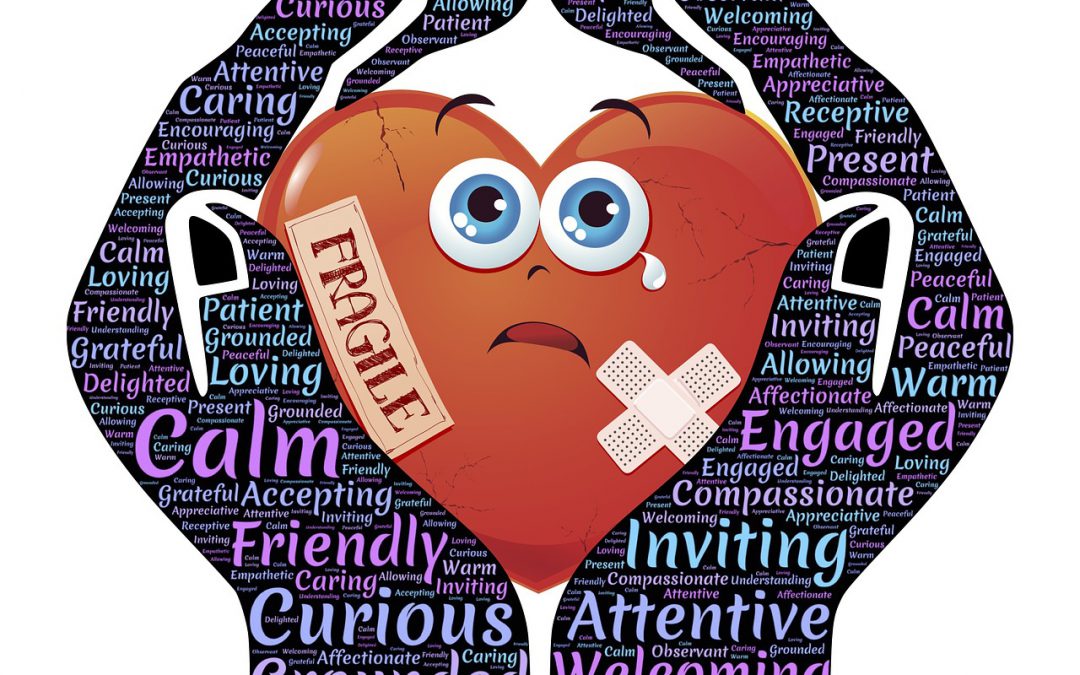
4 Ways My Kindness Suffers from Lack of Attention
It took me a long time to realize that my kindness can suffer from a lack of attention. Although it matters a lot to me to be kind, I am only too aware that it is not always easy.
Do you know the Cherokee folk story about the grandfather talking to his grandson? The Grandfather describes the two wolves that he feels are always battling within him. There is the kindly, caring wolf who looks for peace and harmony and then there is the fierce, angry wolf who likes to fight and make trouble. The grandson asks which wolf will win the battle and his grandfather replies, ‘The one that I feed’.
I always feel that the old grandfather is actually telling the story of how our old brain can undermine our newer brain, the prefrontal cortex at any provocation. Our old brain, or reptilian brain has been passed down to us from our early beginnings when our attention was primarily focused on hunting, procreating and staying alive. It was much later, when we started to gather together in communities in order to protect our families and raise healthy children, that we began to learn the value of cooperation and connection.
So, from one point of view, the wise grandfather is reminding me that kindness might be part of our evolutionary make up, but our self-interest is instinctive. In other words, if we don’t pay attention then our old brain can hijack all our well-meaning intentions.
These are some of the ways it can happen for me.
When does my kindness suffer?
When my opinions take over
We are going through tough times in world events—disastrous wars, austerity, Brexit, climate change, Trump, an increase in support for populism—and our 24/7 media coverage brings it all very close. Like many people, I care a lot about these issues and have strong opinions about how they need to be addressed. The thing is, it’s all too easy to talk about the people that I disagree with in very harsh terms. Sometimes I do not even realize that I am doing it!
When an issue is one we value dearly, then it is hard to tolerate opinions which seem to cut right across those values. We can use the fact that we feel ‘passionate’ about our causes to cover up how we behave in supporting them.
I have come to realize it is not so much use to campaign for things that matter to me in a style that does not fit my values. I don’t make loads of New Year Resolutions, but I am determined to find a way to speak up with strength but not harshness.
When I am too stressed, worried and pre-occupied
When we are stressed, or worried our horizons tend to narrow and we focus more on what is going on for us than with other people. Even being in a rush can lead us to overlook the needs of others. Stress can act in the same way as a threat and trigger our old brain responses. Our thinking brain tends to shut down and we focus our attention on just getting by—rather than noticing other peoples’ needs.
The irony is that we benefit ourselves from practising kindness—it’s not just about the other person.Research shows that kindness can improve heart function, lower blood pressure, slow aging and strengthen our immune systems. The author and scientist, David R. Hamilton explains that through the production of the hormone, oxytocin and the neurotransmitter, serotonin our levels of wellbeing are raised. Anxiety, stress and depression can all be reduced through preforming genuine acts of kindness. When we can open our hearts and minds to pay attention to the needs of others, we feel a sense of relief to connect with the world beyond our own individual worries.
When someone I care about is having a bad time
A few months ago, a close friend of mine got into a frustrating and demoralising hassle about a new work project he was initiating. It was a project he cared a great deal about and he was not given much chance to fight for it before it was cancelled in quite a callous way. When he told me the story, I found myself immediately leaping to his defence and blaming the other people for their lack of vision. I was able to support him with his frustration and disappointment, but it was only later that I realized that I had not been very fair to the other people involved.
That’s another tricky thing about kindness. Most of us are pretty good at giving kindness to those we love and are important to us. It gets much more difficult when we are asked to offer kindness beyond the circle of those we care about—and then even to people we disagree with and perhaps do not even like! I try to remember that there are plenty of people who don’t like me, but I still would like them to treat me fairly.
When I am able to separate a person from their actions, it gets much easier to wish them well and want to show them kindness. However, I can only do this when I am paying attention and not simply reacting.
When I feel let down
It’s only natural to look for emotional support from people we love and trust when life gets hard. We know that being able to express our worries in a supported environment will help us to cope better. The thing is, although each of us is hard wired for kindness and we value and need social connection, all of us are struggling to manage our own day-to-day worries and challenges.
Although we all want to live happy lives and for things to go well, we know that difficulties come along as part of the ups and downs of life. This happens to everyone. When I am going through a challenging time and need my friends to be there for me, it’s not always possible for them. Perhaps they are struggling themselves. When I am paying attention then I can remember this. When I am not then I get hurt.
How can I pay attention?
Meditation
Why is our attention so fickle? We have seen how our reptilian brain can over-ride our more sophisticated reasoning brain but there is more. In 2010 two Harvard psychologists,Gilbert and Killingsworth developed an iPhone app which tracked the happiness of volunteers throughout the day. The results were astonishing: for almost 50% of our waking hours we are thinking about something different to what we are doing, and it does not make us happy. Our ability to ruminate, to think of events of already passed and to anticipate things that have not yet happened clouds our attention and takes us away from our immediate experience. We are simply not fully present to vast stretches of our activity.
Meditation enables us to bring our minds home, to pay attention in the present moment, without judgment. It helps us to connect with our own inner capacity for kindness and builds resilience to the challenges of life. Neuroscientists are discovering that as soon as we begin to practice meditation it is has positive effects on our brain. It is my meditation practice that gives me the foundation for kindness.
Making a habit of giving the benefit of the doubt
With meditation as the ground, I try as much as possible to give people the benefit of the doubt. It’s not always possible to manage it straight away, but gradually it becomes easier to come back to it later on. Perhaps there is an initial burst of frustration, or impatience but then I see what I am doing and remember kindness. It is as an act of self-compassion to forgive myself for not getting there faster.
Remembering to put myself in the other person’s shoes
Another useful technique is to remember to put myself in the other person’s shoes—to try and see things from their point of view, from their own experience. It is hard to begin with but gradually it becomes possible to find the thread of another person’s insecurity, worry, sorrow or conditioning that could be informing their behaviour. If I can, I try to see myself as I might appear to them—what would they see when they look at me?
Most of all, it helps to remember that however much we want to act with kindness and consideration, we are subject to the overwhelming power of our basic instinct to preserve ourselves. Although our kindness is hard-wired we need to pay attention to it in order to bring it into action—it needs intention and focus. Our self-interest is instinctive. Meditation is a sustainable way to calm down our hyper-active minds and pay attention to what is going on with ourselves, with people around us and with our environment.
If you liked this post and feel inspired to go more deeply into kindness, you could try this online course
How to Make Everyday Kindness a Habit
You can find out more here

